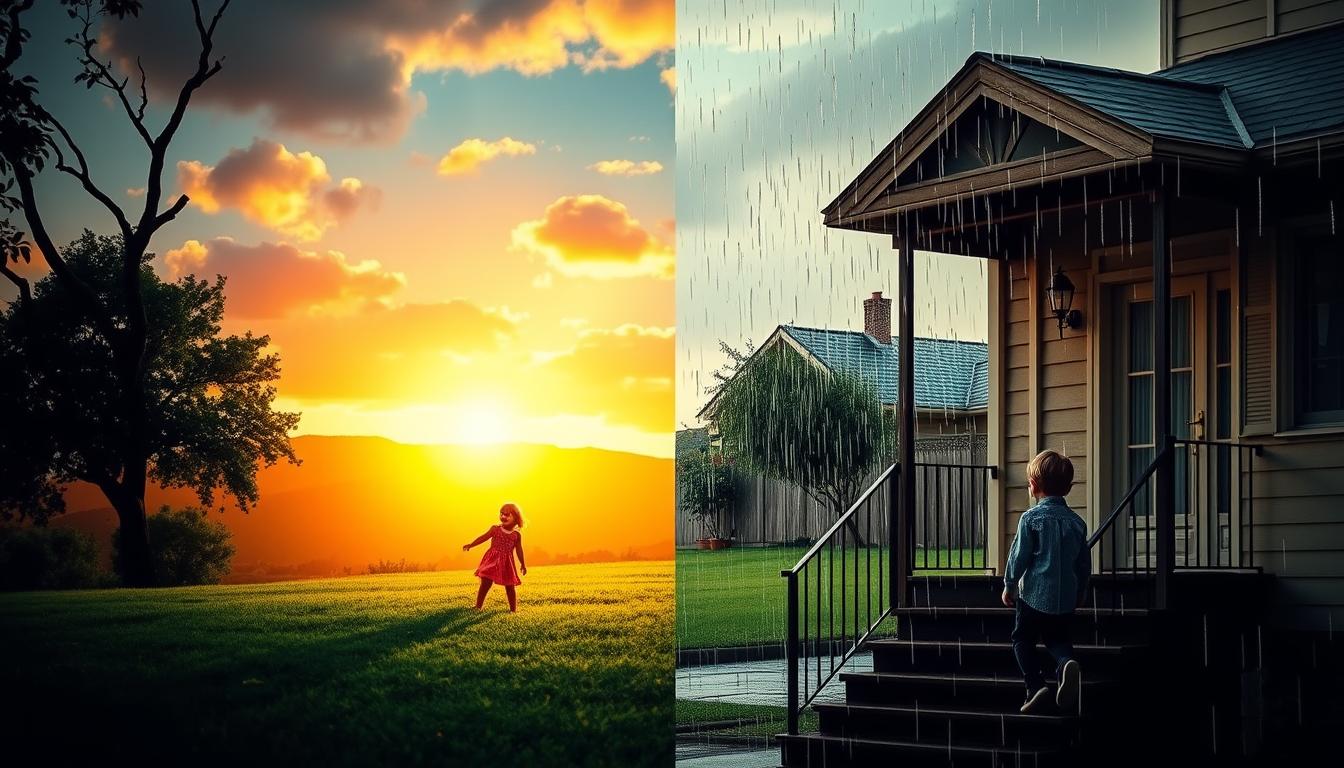What if the emotional effects of divorce on kids are much deeper and last longer than we think? When a family splits up, kids face big changes. These can affect their school work and how they feel inside. It’s key to know how divorce impacts kids, especially with issues like middle child syndrome or talking about puberty.
Divorce changes a family’s life a lot. It can make kids feel different, some adjusting well, others feeling lost. Kids might feel sad, angry, or confused. These feelings can make them more sensitive and affect their happiness.
Doctors and society should focus on making family setups better for kids. This can help lessen the bad effects of divorce.
Key Takeaways
- Divorce can lead to decreased academic achievement and social engagement in children.
- Common emotional responses include sensitivity, anxiety, and increased irritability.
- Children may feel guilt and self-blame, which can impact their mental health.
- Age and temperament significantly influence how children cope with divorce.
- Long-term consequences might include a higher likelihood of engaging in destructive behaviors and increased risk of health problems.
Emotional Effects of Divorce on Children
Divorce can make kids feel many strong emotions. They might feel lost, angry, confused, and anxious. These feelings can make them feel guilty and think they caused the divorce.
Some kids might get angry or upset. They might act out in different ways. This is why they need support, like online family therapy and gentle parenting. These help them deal with their feelings during tough times.
Emotional Sensitivity and Anxiety
Divorce can make kids feel more sensitive and anxious. The changes and uncertainty can overwhelm them. They need lots of support from their caregivers.
Practices that help with anxiety can be very helpful. Kids from divorced homes are more likely to feel depressed and anxious. A study in BMC Pediatrics showed that teens from divorced homes often feel scared and might even think about suicide.
Feelings of Guilt and Self-Blame
Children often feel guilty and blame themselves for their parents’ divorce. This can hurt their self-esteem and mental health. But, studies show that online family therapy can help.
Parents should reassure their kids with gentle parenting. This helps them feel understood and loved.
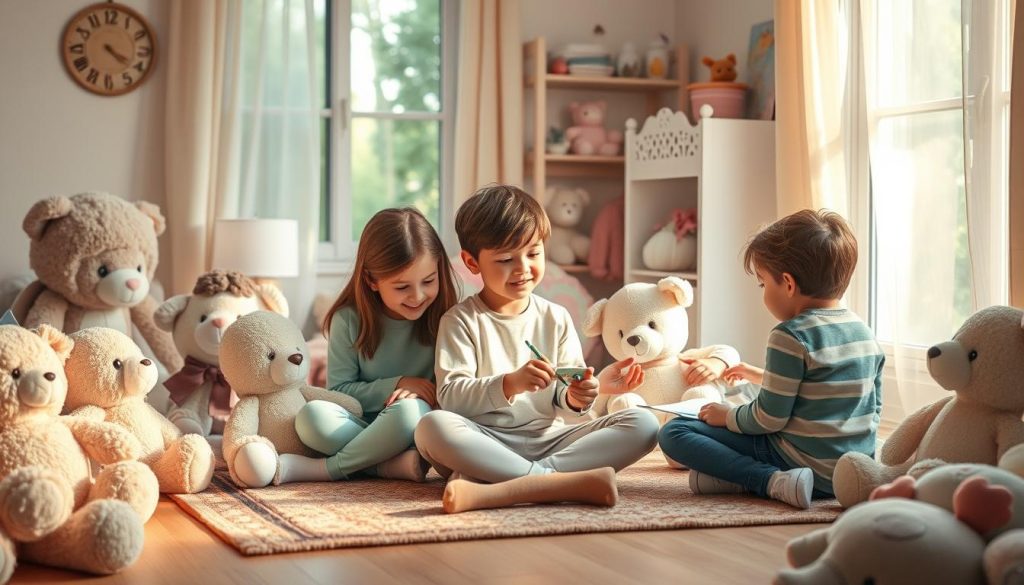
Anger and Irritability
Anger and irritability are common in kids during divorce. They might act out or hurt themselves. According to Psychology Today, kids from divorced homes are more likely to get divorced themselves.
Online family therapy and gentle parenting can help manage these feelings. Also, managing money well can help reduce stress. This creates a more stable home for kids.
Impact on Academic Performance and Social Life
Divorce affects kids’ school work and social life a lot. It often leads to lower grades because of home distractions and emotional stress. Studies show that family rules, like strict parenting, are key to school success.
A study at Shiraz University found a strong link between strict parenting and better grades. The p-value was 0.03.
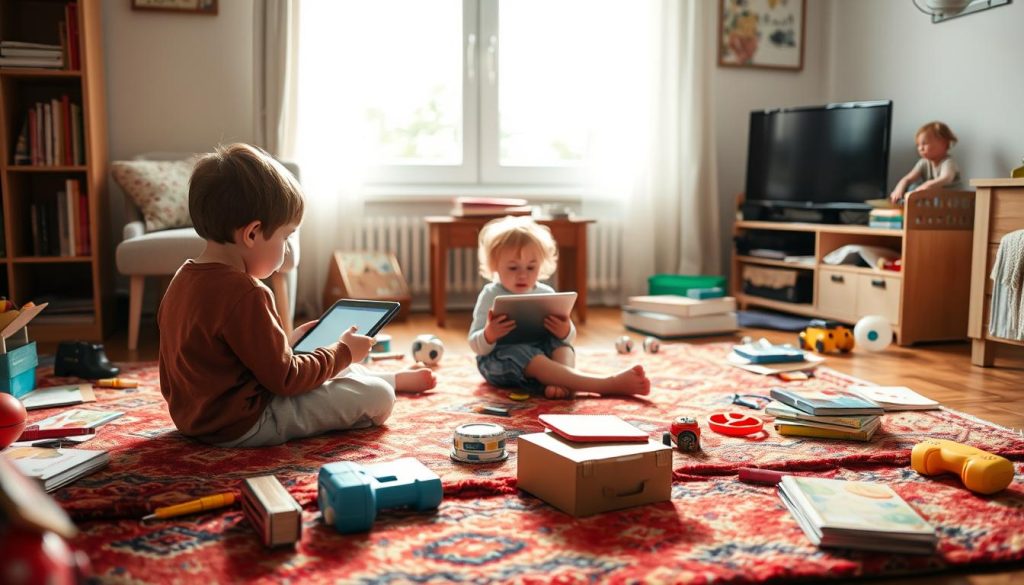
Reduced Academic Performance
Divorce makes it hard for kids to focus on schoolwork, leading to lower grades. Research by Fan and Chen (2001) shows that parents who get involved help kids do better in school. Helping kids focus on learning by limiting screen time can also help.
Decline in Social Activities
After a divorce, kids might pull back from friends and activities. They might feel unsure and less likely to hang out. This can make sibling rivalry worse as they fight for attention.
Getting kids involved in team sports and teaching them about consent can help. It can make them feel better and more confident around others. The NICHD Study of Early Childcare and Youth Development found that kids with involved parents do better socially and behave better.
The Role of Age and Temperament in Coping with Divorce
Children’s age and temperament are key when dealing with divorce. Young kids might not understand what’s happening, leading to more emotional pain. Teenagers, on the other hand, can grasp the divorce’s complexity but face challenges in adjusting to the new family setup.
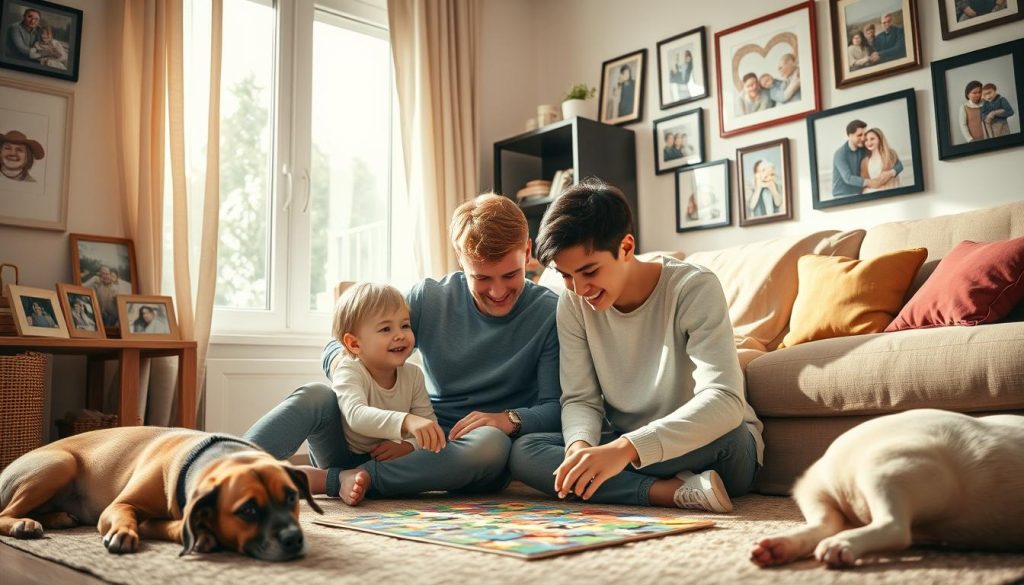
Temperament greatly affects how a child deals with divorce. Kids with tough temperaments find it harder to adjust, needing more support from their parents. Gentle parenting helps them feel safe and secure, allowing them to express their feelings.
Adding new family members through remarriage can make things even more complicated. It’s important to be patient and understanding, making sure each child feels valued. Teaching kids about consent helps build respect and trust, key for a healthy family environment.
Parental conflict deeply affects a child’s adjustment. High conflict can cause anxiety, aggression, and poor school performance. It can also harm brain development, leading to issues like poor emotion control and teen pregnancy. So, it’s crucial for parents to keep their relationship calm and respectful.
Parenting Challenges during and after Divorce
Parenting after a divorce is tough. Parents must create a stable and caring home despite big changes. It’s key to be consistent and clear in talking to kids. Most kids adjust well within two years, but some may take longer.
Starting with a positive relationship and cooperative parenting helps a lot. Keeping in touch and avoiding fights is crucial for kids’ happiness. This way, parents can work together better.
Talking about tough topics like drugs and body image is important. It’s part of keeping kids healthy and happy. Also, teaching kids about the environment is good for them and the planet. It’s a way to bond and teach responsibility.
Many parents get back to normal in two years. But, managing shared custody and parenting is still hard. It’s vital to focus on what’s best for the kids and keep the peace.
Learning from a Massachusetts Probate and Family Court class shows the effort needed. Using mediation instead of court fights is better for everyone. After divorce, parents should keep their kids’ needs and the planet in mind.
The relationship between co-parents greatly affects kids’ happiness. Working together boosts kids’ confidence and problem-solving skills. Remember, kids’ well-being should always come first, even if parents don’t get along.
Long-term Consequences and Risk Factors
Divorce can lead to many risks for kids, like bad behaviors and health issues. It can also make them more likely to get divorced later. It’s important to understand and reduce these risks for kids’ well-being and future families.
Introduction of Destructive Behaviors
Children from divorced families might start bad habits early. This includes smoking, using prescription drugs, and risky sex. These actions often come from emotional pain and lack of support.
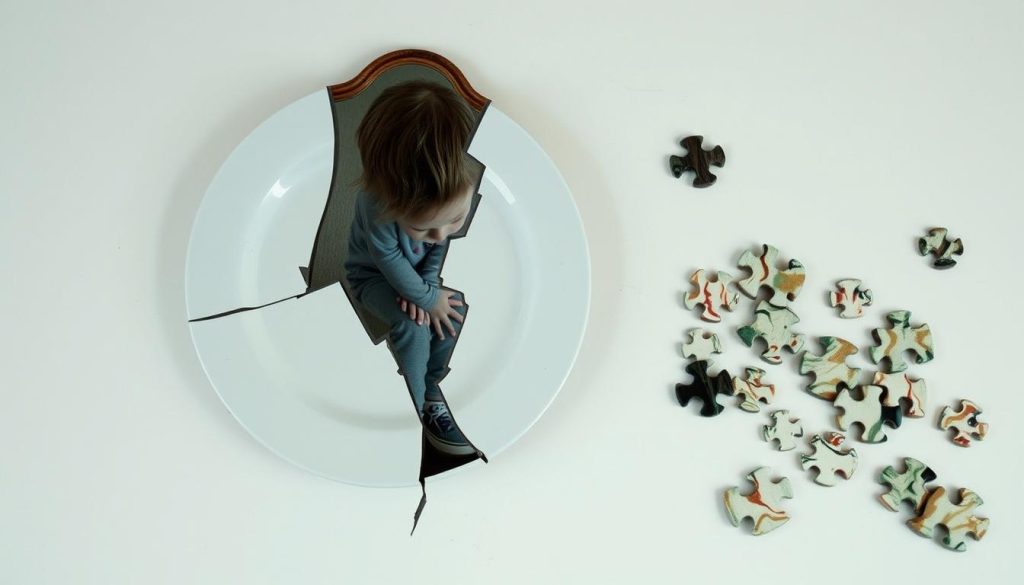
Divorce is also linked to eating disorders in kids. The emotional stress can lead to unhealthy eating. Keeping kids safe online is key to stopping these bad behaviors.
Increased Risk of Health Problems
Divorce can lead to serious health issues in kids. These include diabetes, lung disease, and heart problems. The emotional stress from divorce can make these health issues worse.
Malnutrition and poor vision and oral health can also happen. Online family therapy can help support kids emotionally. This might reduce these health risks.
Increased Likelihood of Future Divorce
Children from divorced families are more likely to get divorced themselves. This creates a cycle of family instability. Early help in building healthy relationships can help break this cycle.
It’s also important to focus on new parents’ mental health. Their emotional state affects their kids. Programs for new parents can help keep families stable and reduce divorce risks.
Conclusion
Divorce affects children in many ways and can last long after the divorce is finalized. Kids may feel anxious, sad, or struggle in school and with friends. They might act out or have trouble controlling their impulses.
Good parenting can help lessen these problems. Gentle and supportive parenting can make a big difference. It helps kids deal with their feelings and stay calm.
Adding eco-friendly habits and keeping routines can also help. These steps create a stable home for kids going through divorce. Teaching kids to control their emotions is key to their growth.
Parents should talk openly and support their kids through this tough time. Managing the family budget and limiting screen time can help keep things stable at home. Research shows that loving and supportive parenting builds resilience in kids.
By using these strategies and getting help when needed, kids can come out of divorce stronger. They will be better prepared for the future.
FAQ
How can divorce affect my child’s emotional well-being?
What should I watch for if my child feels guilty or blames themselves for the divorce?
How might my child exhibit anger or irritability following a divorce?
How does divorce influence a child’s academic performance?
Why might my child withdraw from social activities after a divorce?
How do age and temperament affect a child’s response to divorce?
What are some parenting challenges during and after divorce?
What long-term risks might my child face due to divorce?
How can I support my child’s mental health post-divorce?
How can eco-friendly parenting strategies benefit children during a divorce?
This post contains affiliate links. If you click on a link and make a purchase, I may earn a small commission — at no extra cost to you. Thank you for supporting this blog and helping me keep the patterns free! Read the full Affiliate Disclosure & Transparency.
